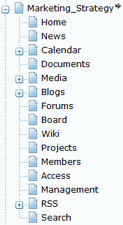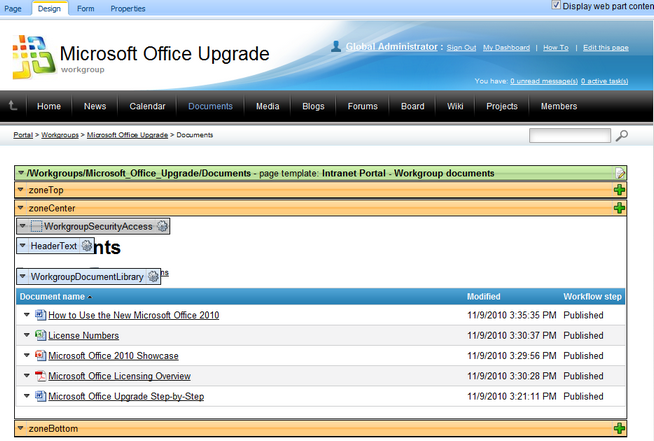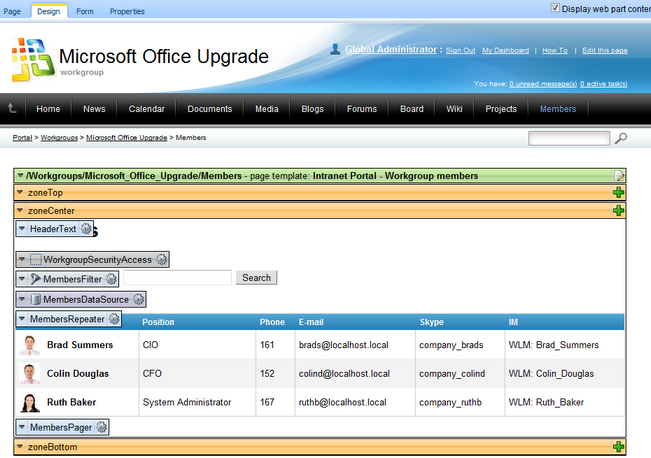|
Managing document-based workgroup features |

|

|

|

|
Most of the functionality provided by the various sub‑sections of a workgroup is based on standard Kentico CMS modules and features. The following topic provides brief descriptions of individual workgroup sections and the modules and features that they are based on, including links to the appropriate documentation in Kentico CMS Developer's Guide. Sections linked with the features that are manageable through the CMS Desk -> Tools -> Groups workgroup editing interface, as described in Developer's Guide -> Modules -> Groups -> Editing a group, are not listed in this topic.

News
The News section is based on standard Kentico CMS documents. Each published news item is a document of the News (CMS.News) document type stored under the News document within the workgroup' s section of the content tree. For more information on document types, please refer to Developer's Guide -> Development -> Document types and transformations.
To enable the adding of news on the live site, the User contributions (Wiki) module is leveraged. Detailed information about the module is located in Developer's Guide -> Modules -> User contributions (Wiki).
Calendar
The calendar used for event scheduling is based on the Booking system module. To find more information about the module, please refer to Developer's Guide -> Modules -> Booking system.
Documents
Document storage on the live site is provided by the Document library module. More information about the use of this module on the portal can be found in the Document libraries chapter of this guide. Complete documentation of the module is located in Developer's Guide -> Modules -> Document library.

Blogs
The functionality of the Blogs section is provided by the Blogs module. Blogs are standard documents in the Kentico CMS content tree, but the module also has its dedicated user interface in CMS Desk -> Blogs. Detailed documentation of the module can be found in Developer's Guide -> Modules -> Blogs.
Wiki
Similar to the News section, the Wiki section is also based on standard Kentico CMS documents. Each published wiki article is of the Simple article (CMS.SimpleArticle) document type, stored under the Wiki document within the workgroup' s section of the content tree.
To enable the adding of articles on the live site, the User contributions (Wiki) module is leveraged. Detailed information about the module is located in Developer's Guide -> Modules -> User contributions (Wiki).
Members
The Members document contains a combination of the following four interconnected web parts: Basic repeater + Group members data source + Filter + Universal pager. These web parts are configured so that the Basic repeater displays users provided by the Group members data source. The data source displays only users who are members of the current workgroup. The filter allows further filtering of the displayed users based on their names and the pager ensures that the list of users is divided into multiple pages in case there is a large amount of workgroup members.

Detailed information about data source web parts can be found in Developer's Guide -> Development -> Web parts -> Data source web parts. A detailed reference concerning the management of users and roles in Kentico CMS is located in Developer's Guide -> Development -> Membership.
Access
This document is not visible in a workgroup's navigation menu. Instead, users are redirected to it when they attempt to view the pages of a workgroup to which they do not have access permissions, typically when they are not members. Relevant information is displayed by the Group security message web part. The path to this document is specified in the Site Manager -> Settings -> Community -> Group security access denied path setting.
This functionality is ensured by Group security access web parts, which are placed on all workgroup documents apart from this one.
Management
This document is also not reachable through a workgroup's navigation menu. It allows workgroup administrators to manage the workgroup directly on the live site as described in Intranet User's Guide -> Workgroups -> Managing workgroups. It must contain the Group profile web part, which provides all necessary functionality. The path to this document is specified in the Site Manager -> Settings -> Community -> Group management path setting.
RSS
The RSS document is not accessible via a workgroup's navigation menu. It contains special child documents which allow users to access RSS feeds of the workgroup's content. This is achieved by web parts of the Syndication module. A full reference can be found in Developer's Guide -> Modules -> Syndication.
Search
This document ensures the functionality of the search box available under the menu in all workgroup sections and displays the search results. The necessary functionality is provided by the Smart search dialog with results web part. Each workgroup uses two search indexes created in Site Manager -> Administration -> Smart search: one for the content of its documents (with a name in format <Workgroup display name> - Default) and another for its forums (with a name in format <Workgroup display name> - Forums). Information about the creation of these indexes for a sample workgroup is described in steps 10 and 11 of the Creating new workgroups topic. For a full reference on the smart search module, please refer to Developer's Guide -> Modules -> Smart search.